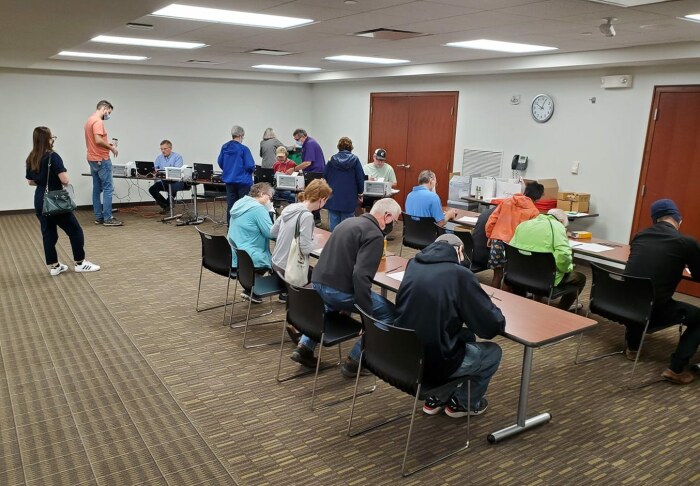Doris J. Kelley is a former member of the Iowa House and former Iowa Board of Parole Chair, Vice-Chair and Executive Director.
With Iowa in its 177th year of statehood (December 28, 1846), we should have our ducks in a row by. But, we are one of six states still in the dark ages when it comes to the primary election process.
Iowa, along with Illinois, Indiana, Ohio, Tennessee and Wyoming operate their primary elections, which selects candidates before the general election, under a process referred to as “partially open.” This system permits voters to cross party lines, but they are required to change their party affiliation.
Thirty-two percent of Iowa’s registered voters have chosen not to be affiliated with the Democrats or Republicans. Free-spirited souls, aren’t they?
As of January 2023, state records showed 31.2 percent of Iowa’s registered voters were “no party.” Another 0.9% were categorized as “other” (primarily Libertarians).
Should these liberated and unconstrained citizens want to vote in Iowa’s primary elections, they must declare as members of a party they may want nothing to do with. Of course, after the primary, they could change their affiliation to no-party again, but what a pain in the . . . buttocks.
What’s wrong with states like Iowa choosing to have a partially open primary, or the fourteen states who have an even more restrictive “closed primary” available only to partisans? Those systems arguably make it easier for the far-right wing and far-left wing candidates and their acolytes to protect and elect oddballs to run for office. Meanwhile, truly independent voters are left on the sideline without much say.
Partisan primaries like Iowa’s disenfranchise voters. It’s a form of voter suppression and dissuades independents from voting. Low primary turnout means fewer voters are choosing their representatives, giving disproportionate influence to a small subset of voters.
If you wonder why we have so many extreme and out-of-touch elected officials representing us in Iowa’s capitol (or in D.C. for that matter), look no further than Iowa’s primary election process. The phrase from the War of 1812 is apropos: “we have met the enemy and he is us.”
Fifteen states (i.e., Alabama, Arkansas, Georgia, Hawaii, Michigan, Minnesota, Mississippi, Missouri, Montana, North Dakota, South Carolina, Texas, Vermont, Virginia and Wisconsin) have an open primary.
The open primary system permits a citizen to cast a vote across party lines and their election privacy is assured. Open primaries increase voter participation as there are no barriers or restraints placed upon their participation. Open primaries permit independents to become more involved in the election process, which is good for our democracy. And, an open primary is election integrity at its zenith.
Some opponents to the open primary system argue it is unconstitutional because it violates their freedom of association. However, the U.S. Constitution does not mention political parties.
Voting is an American principle and a basic right that should be protected, promoted and practiced. Iowa’s partially open primary system creates unnecessary voting difficulties and is discriminatory to more 600,000 Iowans who do not want to be affiliated as a Democrat or Republican.
As Charles Darwin once said, “it is not the strongest of the species that survive, nor the most intelligent, but the one most responsive to change.”
Iowa needs to get out of the dark ages and change to an open primary system, which would give its 36.4 percent registered Republicans, 31.5 percent registered Democrats, 31.2 percent no party voters and 0.9 percent “other” registrants maximum flexibility and maintain their party affiliation or no party affiliation privacy.
All Iowans, as opposed to a small subset of voters, should participate in our primary election process. Let’s embrace change and restore integrity to our primary election procedure by becoming an open primary state.
Editor’s note from Laura Belin: Some analysts consider Iowa to have an open primary system already, since voters without a party affiliation can change on primary election day to vote for candidates in the party of their choosing.
Top photo of Iowans voting in the June 2022 primary posted on Facebook by the Johnson County auditor’s office.


1 Comment
Open Primaries
Do states with open primaries actually have higher voter turnout? I don’t have the answer, but it seems that bit of info would help (or hurt) your case.
As for candidates being “extreme,” Alabama, Arkansas, Georgia, Mississippi, South Carolina, and Texas have produced some pretty darned “extreme” right wing candidates despite open primaries; Vermont and Hawaii have produced some pretty “extreme” left wing candidates. So there is little evidence that changing the primaries will change that outcome.
I guess one of my problems with this is the source. As a Legislator, you disappointed tens of thousands of Iowans – mostly Democrats – while holding a 55-45 advantage in the Iowa House.
After giving you their support to get you elected, you sold out organized labor. It was disingenuous, and as far as I am concerned, made you completely untrustworthy. You refused to vote for labor, the environment, health care, progressive taxation…the list goes on.
You had a chance to shape the Democratic Party from within. And the public strongly disagreed with your lack of action. So now you want to change the party from the outside?
Maybe you should just accept that the majority of Iowa’s Democrats just ain’t buying what you are selling.
Rod Sullivan Fri 20 Jan 3:38 PM